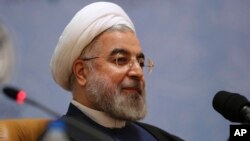As the Iranian parliament begins to discuss the 2014 budget, which takes March 21, some challenges are beginning to emerge in a country with an inflation rate of 44 percent, negative economic growth and high unemployment.
In particular, subsidy reform presents lawmakers with a major challenge.
Iran has doled out subsidies to the tune of about $100 billion per year to the population to help pay for petroleum, medical supplies and basic foodstuffs. They were first used during the Iran-Iraq war, but since the 1990s, three leaders have tried to roll them back.
Last fall, the parliament approved a plan to drop 22 million Iranians--the top 30 percent of earners--from the subsidy system.
Military spending will also be an issue.
On Saturday, Iran’s Parliament Speaker Ali Larijani was quoted by the semi-official Fars news agency saying Iran should boost defense spending in response to what he called “sabre-rattling” by U.S. Secretary of State John Kerry.
Kerry said the U.S. reserves the right for military action against Iran should it violate an interim nuclear deal reached in November.
Gholamreza Kateb, head of the Budget and Auditing Committee of the Iranian parliament, said the goals of new budget are to reduce the gap between saving and investment, to reduce dependency of the budget on oil revenue, to reduce the rate of unemployment and to increase economic growth.
The Budget and Auditing Committee predicts that economic growth next year will reach about 3 percent, and investments will increase by about 2 percent.
President Hassan Rowhani said bringing down inflation and boosting growth were his economic priorities when he presented his first budget to the legislative body last December.
The budget is based on oil selling at $100 a barrel.
In particular, subsidy reform presents lawmakers with a major challenge.
Iran has doled out subsidies to the tune of about $100 billion per year to the population to help pay for petroleum, medical supplies and basic foodstuffs. They were first used during the Iran-Iraq war, but since the 1990s, three leaders have tried to roll them back.
Last fall, the parliament approved a plan to drop 22 million Iranians--the top 30 percent of earners--from the subsidy system.
Military spending will also be an issue.
On Saturday, Iran’s Parliament Speaker Ali Larijani was quoted by the semi-official Fars news agency saying Iran should boost defense spending in response to what he called “sabre-rattling” by U.S. Secretary of State John Kerry.
Kerry said the U.S. reserves the right for military action against Iran should it violate an interim nuclear deal reached in November.
Gholamreza Kateb, head of the Budget and Auditing Committee of the Iranian parliament, said the goals of new budget are to reduce the gap between saving and investment, to reduce dependency of the budget on oil revenue, to reduce the rate of unemployment and to increase economic growth.
The Budget and Auditing Committee predicts that economic growth next year will reach about 3 percent, and investments will increase by about 2 percent.
President Hassan Rowhani said bringing down inflation and boosting growth were his economic priorities when he presented his first budget to the legislative body last December.
The budget is based on oil selling at $100 a barrel.




